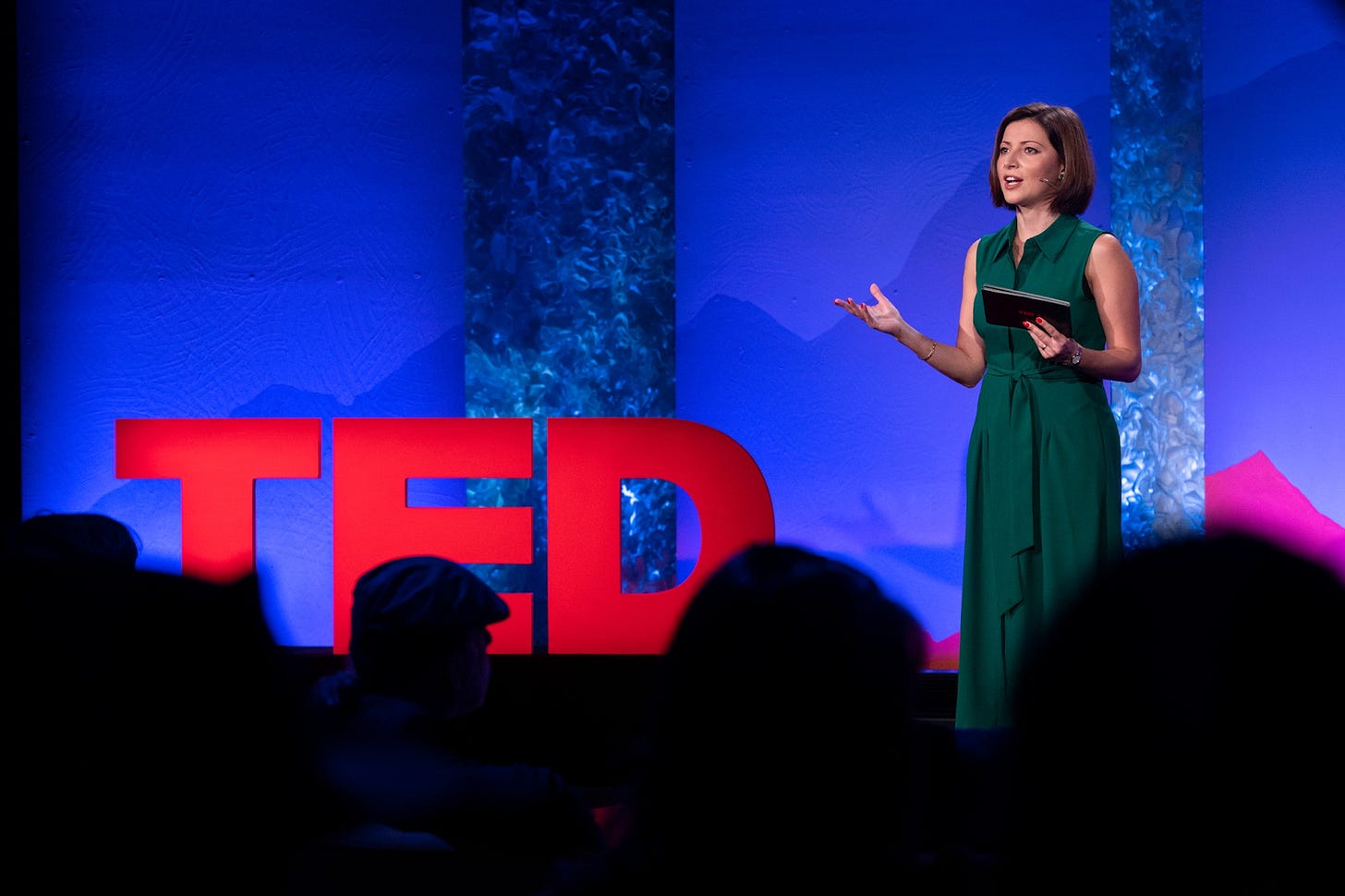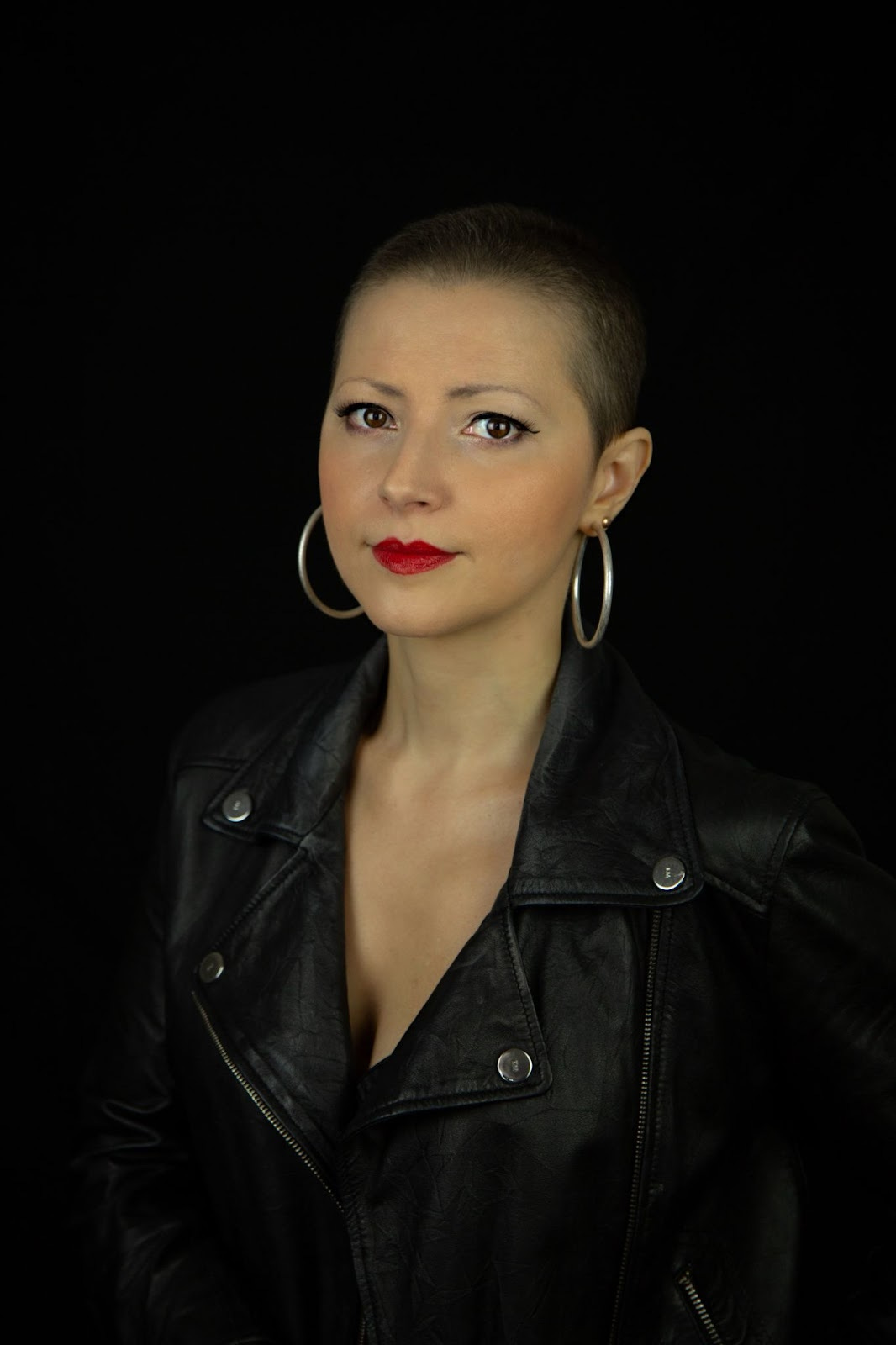BLITZ INTERVIEW: Olesya Khromeychuk -"Those who have not lived amidst the storm do not know the value of strength."
The director of the Ukrainian Institute in London about living through personal and national loss, grief, rage and trauma - with a wish for justice. And then there's that special Ukrainian resilience.
Olesya Khromeychuk. (Photo by Natalie Godec. London 2023.)
Where are you from? And where are you now? Doing what?
I come from a city known by different names to different people: Lviv, Lwów, Lemberik, Lemberg. To me, it’s known as home. A place that taught me to listen to silences and notice absences. For the past 25 years, I’ve lived in the UK. I call London home as well. It is a tough city, but one that accepts you for who you are.
Since 2020, I’ve been privileged to lead the Ukrainian Institute London (UIL), an independent charity dedicated to sharing with the British public how much there is to learn from Ukraine—lessons vital for safeguarding our freedoms and the increasingly fragile democratic order. It’s a dream job.
What kind of studies and work did you do previously?
Before joining the UIL as a director, I spent a decade teaching the history of east-central Europe at several British universities, including King’s College London, Cambridge and University College London (UCL). I’ve always wanted to teach Ukraine, but in the UK—as in much of the world—courses on Ukraine are few and far between. In regional studies, Ukraine falls between the cracks: it’s “too European” for the study of Eurasia and too “Soviet” for the study of east-central Europe. History departments wouldn’t even consider having a whole module (not to mention a degree) focusing on a ‘small’ country like Ukraine.
I smuggled Ukraine into my classes on the USSR, which often had a strong Russia-centric bias, and into classes covering the modern European Union, because Ukraine provides a rich case study for historians to explore themes of self-governance, state-building, revolutionary movements and grassroots resilience.
As a student, I often felt disheartened by the overwhelming academic focus on the imperial (or former imperial) center, while the peripheries were only discussed in relation to those dominant powers. When the time came to choose my master’s thesis topic at Oxford, my advisers suggested I write about Russia’s foreign policy toward Ukraine. I pushed back, explaining that I wanted to focus on Ukraine. They responded by proposing I write about Ukraine’s foreign policy towards Russia. So, I decided to write about Ukraine during the Second World War, largely unsupervised. At that time, British archives had just declassified a series of documents on the Waffen SS Galicia Division, which had surrendered to the British at the war's end. I was thrilled to be the first researcher to examine these archives.
This discovery inspired me to pursue a PhD. Still, despite having stumbled upon a historian's dream, I couldn’t find anyone at Oxford to supervise a doctoral thesis focused solely on Ukraine adequately. I ended up doing my PhD at UCL, where expertise in Ukrainian studies was still limited, but at least I wasn’t told to switch my research focus to Russia. Eventually, my thesis was published as a book. ‘Undetermined’ Ukrainians was well-received by scholars of World War II, and I’m grateful to my younger self for not succumbing to the pressure to write on Russia’s foreign policy.
Things have changed somewhat since my student days, but it took brutal violence directed at the people of Ukraine to draw the academic community’s attention to that part of the region and begin to treat it not as an appendix to the imperial center but as a major player without the knowledge of which we cannot understand political and historical processes in Europe. We still have a long way to go in how we approach the study of what’s perceived as a subaltern.
We have to work on our own lingering imperialism because it is blinding us and allowing us to make fatal mistakes, as was the case in 2022 when so many academic commentators gave Ukraine three days. Three years on, I hope at least some of them have done some soul-searching to see why they’ve been so wrong and so quick to accept the sacrifice of 40 million people to an aggressor whose genocidal appetite did not appear yesterday.
How has the war in Ukraine changed your life? Changed you personally?
It's no exaggeration to say that Russia's war in Ukraine has changed the world. Naturally, it has completely transformed my own life, too. The world I knew before the war no longer exists in many ways.
Russia took my brother’s life; he was killed in action in 2017 at a time when the world still treated Vladimir Putin as a peace broker. Because Russia enjoyed impunity for causing destruction and deaths like my brother’s, it felt emboldened to launch an even more devastating invasion in 2022.
On a personal level, the full-scale war has given me a different kind of voice. I no longer feel like Cassandra, endlessly trying to speak the truth and only being ignored. I felt this way while writing The Death of a Soldier Told by His Sister. Now, I focus on sharing the knowledge and lessons from Ukraine that can help us confront global challenges, such as the rise of anti-democratic movements and the tendency to disguise cowardice and self-interest as pacifism. I know those genuinely searching for solutions will listen, and I no longer expend energy on those who stubbornly refuse to engage with reality.
(https://www.amazon.co.uk/Death-Soldier-Told-His-Sister/dp/1800961200)
Since 2022, I've traveled extensively—from the west coast of North America to Australia, Japan, India, and across Europe—to speak about Ukraine. At long last, there is a widespread desire to hear from Ukrainians, and I've had the privilege of being one of those voices, amplifying the experiences of my fellow Ukrainians. While it’s true that the world is finally eager to discover Ukraine, some invitations have felt tokenistic: the once common practice of discussing Ukraine without Ukrainians is now considered poor taste, and I frequently get a last-minute invitation from organizers who remember that they need a “Ukrainian voice.” Yet regardless of the reasons behind these invitations, I approach each platform I’m given with responsibility. I know that there will always be people listening with open minds and generous hearts among the audience, and that is a true gift.
What has surprised you most about Ukrainians these past couple of years? Good or bad?
I can’t say I was surprised because I know Ukrainians and expected them to be united, firm, and to stand their ground. What always re-energizes me whenever I go back to Ukraine is witnessing how my fellow countrywomen and men carry on with life no matter what. They create theatre and art amidst war, they throw themselves into supporting the army in countless ways, and use their sharp sense of humor even at the bleakest of times.
There’s a fair amount of bickering, too, especially online. We have a brilliant Ukrainian word for it: srach, which could be roughly translated as “shit storm.” Yet I don’t necessarily see this venting as harmful. It can be a bit juvenile and sometimes hurtful, but it also reflects a society that values expressing differences and having disagreements. I’d be much more alarmed if a nation of 40 million people agreed on everything.
What are your plans?
My main goal at the moment is quite simple: to survive. I’m currently undergoing breast cancer treatment, having received the diagnosis during the third year of the full-scale war, just when I thought things couldn’t get much worse. Despite everything, I am incredibly fortunate to be surrounded by much support and solidarity. I’ve also found a way to process this new form of trauma through writing. I started a Substack account, Wounds and Words, where I share reflections prompted by my illness and treatment.
As with my book, it means a great deal when readers tell me my writing has helped them normalize their experiences. It’s a reminder that when life hands you lemons, you might as well turn them into material for your writing—because you never know whom it might benefit.
The plan beyond recovery is to continue writing. I already have an idea for my next book and am eager to carve out the time and headspace to put those ideas down on paper, which are gradually taking shape in my mind. We also continue a fantastic program of events and projects at the UIL, so there’s never a quiet moment, and I like it that way.
(Photo by Nicola Roper. London 2024.)
How do you see the war ending and Ukraine returning to a normal life?
There won’t be any return to normal life, which we all need to come to terms with—at least for my generation. Our lives will be forever scarred by grief, loss, rage, and trauma. But to avoid passing these on to future generations, we must ensure justice. In the latest issue of the London Ukrainian Review, published by the UIL in partnership with the IWM and ASP, Nobel Peace Prize laureate Oleksandra Matviichuk warns that “[i]f the demand for justice is not met, it may very well transform into a demand for revenge. And this perpetuates the cycle of violence.”
It’s our responsibility to do our best so that every person wronged by Russia—and I mean every single one—feels that their pain has not been overlooked. While compensation will never replace a lost loved one, people must know that their suffering has been acknowledged, respected, and addressed. A lasting peace—not a mere ceasefire that suits politicians far removed from bombs and carnage—will only be possible when paired with genuine justice.
Putting my Cassandra hat on here once more, I will say something that people in peaceful cities are reluctant to hear: ignorance, no matter how blissful, isn’t an ally in times of war. Look into what your political leaders are doing to prepare for a potential conflict with Russia and its allies. If these preparations end up being futile, so much the better. But this is the case where we’re better off safe than sorry.
Tell us one thing you don’t think people abroad know about Ukraine – but they really should?
There’s a powerful line from my favorite Ukrainian author, Lesia Ukrainka, which I’m planning to have as my next tattoo: “Хто не жив посеред бурі, той ціни не знає силі”—"Those who have not lived amidst the storm do not know the value of strength.”
Ukrainians have weathered many storms throughout history. We’ll get through this one, too, because we understand the true worth of our strength.







A most impressive, intelligent and courageous woman.
Heroyim slava!
Богиня. Неймовірна любов до рідноі землі Вас націлить і Ви вийдете ще сильніша!
(A goddess. Your incredible love for your homeland will fortify you and you’ll come out of this even stronger!)